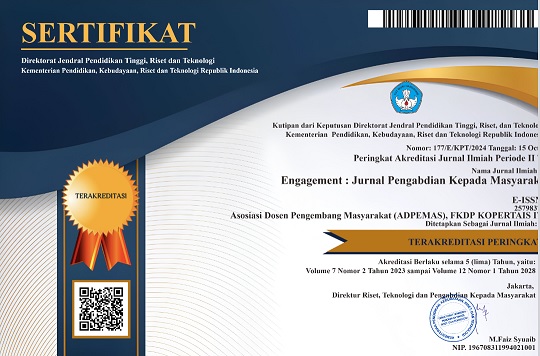Skill-based Health Education for Adolescent Mental Health through the HOPE
Abstract
Globally, it is estimated that 10-20% of adolescents experience mental health problems and remains underdiagnosed and untreated. Mental health activities have not been active in Sekaran Public Health Center. Community partnership provide mental health education, training to overcome and prevent mental health problems, and to be peer educators by HOPE (Health Educated, Organized, Practiced, and Empowered) method. Twelve adolescents were screened by Strengths and Difficulties Questionnaire (SDQ). All youth cadres had normal difficulty scores, emotional symptoms, and hyperactivity. Two adolescents have threshold category in behavior problems, an adolescent has threshold category in peer problems, and an adolescent has abnormal category in proposocial behavior. There is a difference in mental health knowledge between before and after education is given (p=0,014). It is important for health facilities to regularly provide education and empowerment of adolescents in mental health. This HOPE method can be implemented for other health facilities.
Downloads
References
Ahorsu, Daniel Kwasi, Dalinda Isabel Sánchez Vidaña, Donald Lipardo, Parth Bharat Shah, Pablo Cruz González, Sachin Shende, Shilpa Gurung, et al. “Effect of a Peer‐led Intervention Combining Mental Health Promotion with Coping‐strategy‐based Workshops on Mental Health Awareness, Help‐seeking Behavior, and Wellbeing among University Students in Hong Kong.” International Journal of Mental Health Systems 15, no. 1 (2021): 6.
Bøe, Tormod, Mari Hysing, Jens Christoffer Skogen, and Kyrre Breivik. “The Strengths and Difficulties Questionnaire (SDQ): Factor Structure and Gender Equivalence in Norwegian Adolescents.” PLOS ONE 11, no. 5 (May 2016): e0152202.
BPS Kota Semarang. Kota Semarang Dalam Angka 2021. Kota Semarang: BPS Kota Semarang, 2021.
Das, Jai K, Rehana A Salam, Zohra S Lassi, Marium Naveed Khan, Wajeeha Mahmood, Vikram Patel, and Zulfiqar A Bhutta. “Interventions for Adolescent Mental Health: An Overview of Systematic Reviews.” The Journal of adolescent health : official publication of the Society for Adolescent Medicine 59, no. 4S (October 2016): S49–S60.
de Figueiredo, Camila Saggioro, Poliana Capucho Sandre, Liana Catarina Lima Portugal, Thalita Mázala-de-Oliveira, Luana da Silva Chagas, Ícaro Raony, Elenn Soares Ferreira, Elizabeth Giestal-de-Araujo, Aline Araujo dos Santos, and Priscilla Oliveira-Silva Bomfim. “COVID-19 Pandemic Impact on Children and Adolescents’ Mental Health: Biological, Environmental, and Social Factors.” Progress in Neuro-Psychopharmacology and Biological Psychiatry 106 (2021): 110171.
Hall, Charlotte L, Boliang Guo, Althea Z Valentine, Madeline J Groom, David Daley, Kapil Sayal, and Chris Hollis. “The Validity of the Strengths and Difficulties Questionnaire (SDQ) for Children with ADHD Symptoms.” PloS one 14, no. 6 (June 2019): e0218518–e0218518.
Hart, Laura M, Amy J Morgan, Alyssia Rossetto, Claire M Kelly, Andrew Mackinnon, and Anthony F Jorm. “Helping Adolescents to Better Support Their Peers with a Mental Health Problem: A Cluster-Randomised Crossover Trial of Teen Mental Health First Aid.” The Australian and New Zealand journal of psychiatry 52, no. 7 (July 2018): 638–651.
Kessler, Ronald C, Matthias Angermeyer, James C Anthony, Ron DE Graaf, Koen Demyttenaere, Isabelle Gasquet, Giovanni DE Girolamo, et al. “Lifetime Prevalence and Age-of-Onset Distributions of Mental Disorders in the World Health Organization’s World Mental Health Survey Initiative.” World psychiatry : official journal of the World Psychiatric Association (WPA) 6, no. 3 (October 2007): 168–176.
Khasanah, Nopi Nur, Herry Susanto, and Samsudin Samsudin. “Pengabdian Masyarakat Melalui Penerapan Metode Peer Counselor Dengan Pendekatan Spiritual Pada Pemrakarsa Kelompok Anti Kekerasan Seksual Pada Anak.” Engagement: Jurnal Pengabdian Kepada Masyarakat 4, no. 1 (2020): 156–165.
Koepke, Sabrina, and Jaap J A Denissen. “Dynamics of Identity Development and Separation–Individuation in Parent–Child Relationships during Adolescence and Emerging Adulthood – A Conceptual Integration.” Developmental Review 32, no. 1 (2012): 67–88.
Mundakir, I’in Masfiyah, Uswatun Hasanah, and Sukadiono. “Menurunkan Kecemasan Remaja Pada Masa Pandemi Covid-9 Melalui Pendidikan Kesehatan Secara Daring Di Dukuh Sutorejo Kecamatan Mulyorejo.” Aksiologiya : Jurnal Pengabdian Kepada Masyarakat 5, no. 4 (2021): 600–609.
Nielsen, Louise G, Martin K Rimvall, Lars Clemmensen, Anja Munkholm, Hanne Elberling, Else Marie Olsen, Charlotte Ulrikka Rask, Anne Mette Skovgaard, and Pia Jeppesen. “The Predictive Validity of the Strengths and Difficulties Questionnaire in Preschool Age to Identify Mental Disorders in Preadolescence.” PLOS ONE 14, no. 6 (June 2019): e0217707.
Rothe, Josefine, Judith Buse, Anne Uhlmann, Annet Bluschke, and Veit Roessner. “Changes in Emotions and Worries during the Covid-19 Pandemic: An Online-Survey with Children and Adults with and without Mental Health Conditions.” Child and Adolescent Psychiatry and Mental Health 15, no. 1 (2021): 11.
Susanto, Bela Novita Amaris, Nofri Zayani, and Maylinda Indah Sari. “Pemberdayaan Siswa Sebagai Peer Educator Pencegahan Perilaku Seksual Beresiko Di SMK Negeri 28 Kabupaten Tangerang.” Aksiologiya : Jurnal Pengabdian Kepada Masyarakat 5, no. 4 (2021): 459–465.
WHO. “Adolescent Mental Health.”
WHO, “Adolescents: Health Risks and Solutions.”
Wimbarti, Supra, Juliarni Siregar, Mistety Oktaviana, and Regiastri Regiastri. “Strengths and Difficulties Questionnaire Parent Report (SDQ-PR) As Screening Instrument of Children Mental Health in Indonesia.” Jurnal Psikologi; Vol 46, No 2 (2019)DO - 10.22146/jpsi.46698 (August 2019).
Zare, Somayeh, Mohammad Hossein Kaveh, Ahmad Ghanizadeh, Abdolrahim Asadollahi, and Mahin Nazari. “Promoting Mental Health Literacy in Female Students: A School-Based Educational Intervention.” Health Education Journal 80, no. 6 (May 2021): 734–745.
Copyright (c) 2022 Engagement: Jurnal Pengabdian Kepada Masyarakat

This work is licensed under a Creative Commons Attribution-ShareAlike 4.0 International License.






.png)




